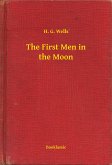In "The First Men in the Moon," H. G. Wells embarks on a visionary exploration of space travel, intertwining scientific speculation with rich narrative finesse. Written in 1901, the novel mirrors the zeitgeist of the burgeoning scientific age, poetically capturing the awe and trepidation surrounding humanity's ventures into the cosmos. The narrative follows the protagonist, Mr. Bedford, and the eccentric scientist, Dr. Cave, as they journey to the Moon in a remarkable spherical spacecraft, unveiling an intricate, imaginative world populated by the enigmatic Selenites. Wells's prose, characterized by a blend of vivid imagery and satirical wit, critiques contemporary Victorian society while engaging with themes of imperialism, evolution, and the potentialities of human ingenuity. H.G. Wells, often hailed as the father of science fiction, was deeply influenced by the scientific advancements of his time, including the Industrial Revolution and Darwinian theories. His formative experiences-often characterized by a keen belief in the transformative power of technology-shaped his writing. "The First Men in the Moon" is emblematic of Wells's engagement with philosophical questions of progress and morality in light of scientific discovery, drawing upon his understanding of contemporary scientific discourse, including theories of gravity and space. This seminal work is an essential read for enthusiasts of science fiction and for anyone interested in the intersection of science, society, and literature. Through Wells's pioneering narrative, readers are invited to reflect on the potential futures of humanity and the cosmos, making this book not just a thrilling adventure, but also a profound commentary on the aspirations and ethical dilemmas of human advancement.
Dieser Download kann aus rechtlichen Gründen nur mit Rechnungsadresse in A, B, BG, CY, CZ, D, DK, EW, FIN, F, GR, H, IRL, I, LT, L, LR, M, NL, PL, P, R, S, SLO, SK ausgeliefert werden.









